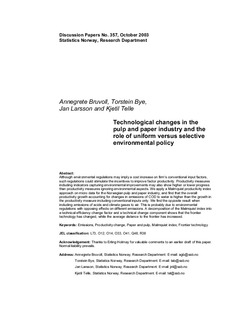Technological changes in the pulp and paper industry and the role of uniform versus selective environmental policy
Working paper

Åpne
Permanent lenke
http://hdl.handle.net/11250/180511Utgivelsesdato
2003Metadata
Vis full innførselSamlinger
- Discussion Papers [1002]
Sammendrag
Abstract:
Although environmental regulations may imply a cost increase on firm's conventional input factors,
such regulations could stimulate the incentives to improve factor productivity. Productivity measures
including indicators capturing environmental improvements may also show higher or lower progress
than productivity measures ignoring environmental aspects. We apply a Malmquist productivity index
approach on micro data for the Norwegian pulp and paper industry, and find that the overall
productivity growth accounting for changes in emissions of COD to water is higher than the growth in
the productivity measure including conventional inputs only. We find the opposite result when
including emissions of acids and climate gases to air. This is probably due to environmental
regulations with opposing effects on different emissions. A decomposition of the Malmquist index into
a technical efficiency change factor and a technical change component shows that the frontier
technology has changed, while the average distance to the frontier has increased.
Keywords: Emissions, Productivity change, Paper and pulp, Malmquist index, Frontier technology
Utgiver
Statistics Norway, Research DepartmentSerie
Discussion Papers;No. 357Beslektede innførsler
Viser innførsler beslektet ved tittel, forfatter og emneord.
-
The impacts of alternative policy instruments on environmental performance. A firm level study of temporary and persistent effects
Bye, Brita; Klemetsen, Marit Elisabeth (Discussion papers;788, Working paper, 2014-10)We study the effects of various environmental regulations on environmental performance measured as emission intensity. Moreover, we aim to test whether any such effects are persistent or only temporary. Conventional theory ... -
The welfare effects of carbon policies: grandfathered quotas versus differentiated taxes
Bye, Brita; Nyborg, Karine (Discussion Papers;No. 261, Working paper, 1999)Recently, it has been demonstrated that pre-existing distortionary taxes can substantially increase the costs of market-based instruments which do not raise revenue, such as non-auctioned emissions quotas. Revenue-raising ... -
Labour market rigidities and environmental tax reforms : welfare effects of different regimes
Bye, Brita (Discussion Papers;No. 242, Working paper, 1998)The working of the labour market is important for the total welfare effects of tax reforms. This paper analyses, by using a computable general equilibrium model for the Norwegian economy, how different assumptions about ...